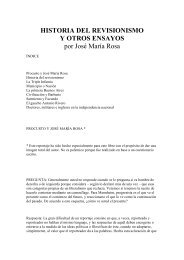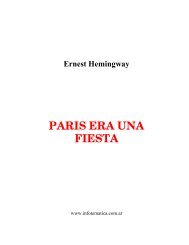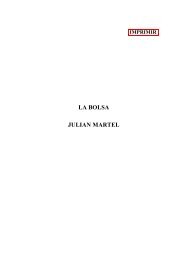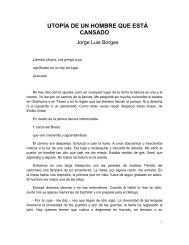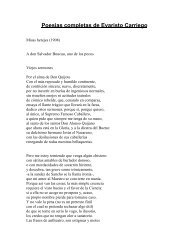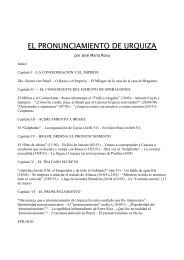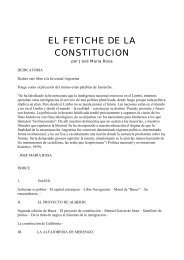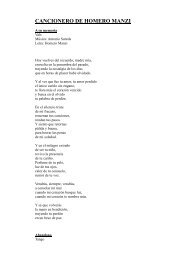You also want an ePaper? Increase the reach of your titles
YUMPU automatically turns print PDFs into web optimized ePapers that Google loves.
"The Unbearable Lightness Of Being" By Milan Kundera 51<br />
to him that what he considered unreal (the work he did in the solitude of the office or<br />
library) was in fact his real life, whereas the parades he imagined to be reality were<br />
nothing but theater, dance, carnival—in other words, a dream.<br />
During her studies, Sabina lived in a dormitory. On May Day all the students had to<br />
report early in the morning for the parade. Student officials would comb the building to<br />
ensure that no one was missing. Sabina hid in the lavatory. Not until long after the<br />
building was empty would she go back to her room. It was quieter than anywhere she<br />
could remember. The only sound was the parade music echoing in the distance. It was<br />
as though she had found refuge inside a shell and the only sound she could hear was<br />
the sea of an inimical world.<br />
A year or two after emigrating, she happened to be in Paris on the anniversary of the<br />
Russian invasion of her country. A protest march had been scheduled, and she felt<br />
driven to take part. Fists raised high, the young Frenchmen shouted out slogans<br />
condemning Soviet imperialism. She liked the slogans, but to her surprise she found<br />
herself unable to shout along with them. She lasted no more than a few minutes in the<br />
parade.<br />
When she told her French friends about it, they were amazed. You mean you don't<br />
want to fight the occupation of your country? She would have liked to tell them that<br />
behind Communism, Fascism, behind all occupations and invasions lurks a more basic,<br />
pervasive evil and that the image of that evil was a parade of people marching by with<br />
raised fists and shouting identical syllables in unison. But she knew she would never be<br />
able to make them understand. Embarrassed, she changed the subject.<br />
THE BEAUTY OF NEW YORK<br />
Franz and Sabina would walk the streets of New York for hours at a time. The view<br />
changed with each step, as if they were following a winding mountain path surrounded<br />
by breathtaking scenery: a young man kneeling in the middle of the sidewalk praying;<br />
a few steps away, a beautiful black woman leaning against a tree; a man in a black suit<br />
directing an invisible orchestra while crossing the street; a fountain spurting water and a<br />
group of construction workers sitting on the rim eating lunch; strange iron ladders<br />
running up and down buildings with ugly red facades, so ugly that they were beautiful;<br />
and next door, a huge glass skyscraper backed by another, itself topped by a small<br />
Arabian pleasure-dome with turrets, galleries, and gilded columns.<br />
She was reminded of her paintings. There, too, incongruous things came together: a<br />
steelworks construction site superimposed on a kerosene lamp; an old-fashioned lamp<br />
with a painted-glass shade shattered into tiny splinters and rising up over a desolate<br />
landscape of marshland.<br />
Franz said, Beauty in the European sense has always had a premeditated quality to it.<br />
We've always had an aesthetic intention and a long-range plan. That's what enabled<br />
Western man to spend decades building a Gothic cathedral or a Renaissance piazza.<br />
The beauty of New York rests on a completely different base. It's unintentional. It arose



